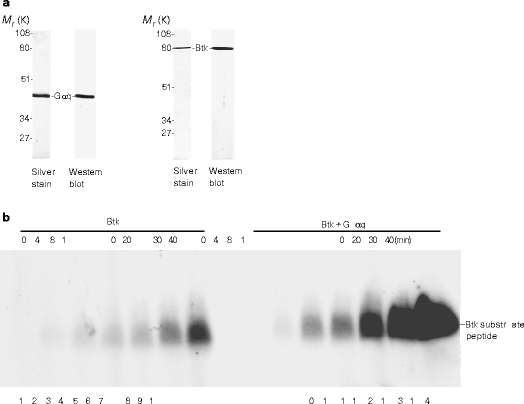Direct stimulation of Bruton's tyrosine kinase by Gq-protein α-subunit
- Select a language for the TTS:
- UK English Female
- UK English Male
- US English Female
- US English Male
- Australian Female
- Australian Male
- Language selected: (auto detect) - EN

Play all audios:

Heterotrimeric guanine-nucleotide-binding regulatory proteins (G proteins) transduce signals from a wide variety of cell-surface receptors to generate physiological responses1.
Protein-tyrosine kinases are another group of critical cellular signal transducers and their malfunction often leads to cancer2. Although activation of G-protein-coupled receptors can elicit
rapid stimulation of cellular protein-tyrosine phosphorylation3, the mechanism used by G proteins to activate protein-tyrosine kinases is unclear. Here we show that the purified α-subunit
of the Gq class of G proteins (Gαq) directly stimulates the activity of a purified non-receptor kinase, Bruton's tyrosine kinase (Btk)4, whereas purified α-subunits from Gi1, GO or Gz
proteins do not. Gαq can also activate Btk in vivo. Furthermore, in Btk-deficient cells, stimulation of another kinase, a p38 MAP kinase, by Gq-coupled receptors is blocked. Our results
demonstrate that certain protein-tyrosine kinases can be direct effectors of G proteins.
We thank M. Stieger for plasmid pREP4groESL; T. Kurosaki for Btk-deficient DT40 cells; P. Low for plasmic pCDB3/T7-7; and L. Levin, T. Maack, C. Malbon and members of our laboratory for
reading the manuscript. Part of the Sf9 cells were cultured in the National Cell Culture Center which is supported by the National Center for Research Resources. This work was supported by
grants from the NIH, the NSF and the American Heart Association. X-Y.H. is a Cornell Scholar and a Beatrice F. Parvin Investigator of the American Heart Association New York City affiliate.
Kendra Bence, Wei Ma and Xin-Yun Huang: These authors contributed equally to this work.
Xin-Yun Huang: Correspondence and requests for materials should be addressed to X.-Y.H.
Department of Physiology, Cornell University Medical College, 1300 York Avenue, New York, 10021, New York, USA
Department of Pharmacology, University of Texas Southwestern Medical Center, Dallas, 75235, Texas, USA
Anyone you share the following link with will be able to read this content: